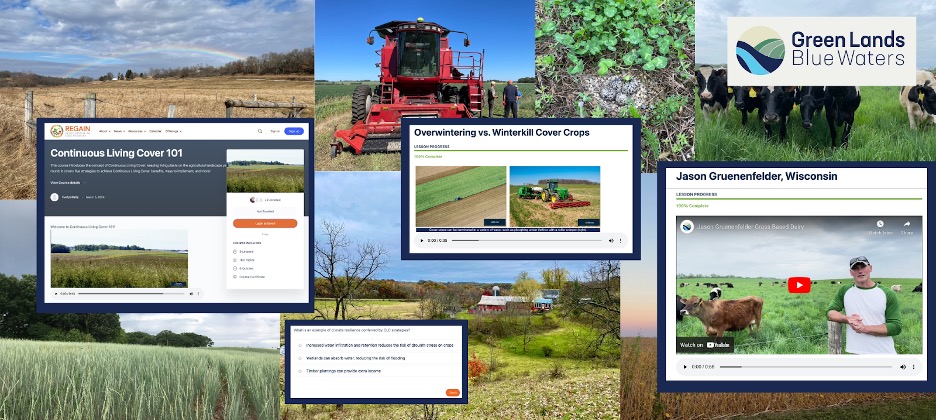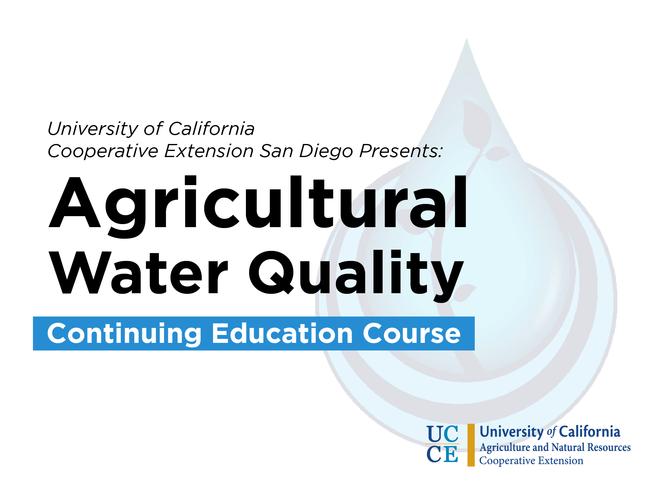Extension Foundation Online Campus

CLC 101 introduces the concept of Continuous Living Cover - in-field strategies that maintain living roots and cover on the ground all year. It describes five basic strategies to achieve CLC (annuals + cover crops, agroforestry, perennial grains, perennial forage and grazing, and perennial biomass), and goes over economic and environmental benefits with on-farm examples. It also covers how to talk to farmers and support them in choosing and implementing CLC strategies. Throughout the course, there are recommendations on where to find more information. This course is designed for technical advisors, but is also relevant for farmers, graduate students, and other agricultural conservation professionals. The course is entirely virtual, free of charge, and self-paced. [Currently, there is no planned downtime for the course.]
- Teacher: Marjorie Hegstrom
- Teacher: Evelyn Reilly
- Teacher: Aaron Reser
The
Sustainable Bioeconomy course examines the current and future opportunities and
challenges of bioproducts and bioenergy in society. This course explores
relationships between society’s economic demand for inexpensive energy and
products and our responsibility to produce these products in environmentally
and socially responsible ways. Students explore a range of bioproduct
categories including biofuels, virgin and recycled paper and wood products, and
advanced biomaterials. A panel of instructors from multiple disciplines and
bioeconomy stakeholders will share their diverse perspectives and experiences
in the bioeconomy. Students will learn about careers available in the growing
bioeconomy sector and the knowledge and skills necessary for these jobs.
- Teacher: Richard Venditti

A fully online, professional development opportunity for high school ag and science teachers in Nebraska to learn more about soil science and how it can be incorporated into their curriculum in meeting the Nebraska Science Standards.
- Teacher: Meghan Sindelar
Manure Application Training – Liquid Manure is an online training for manure applicators, especially for those who are new to the industry. Learners will be guided through the seven steps of manure application—Equipment Inspection, Loading Manure, Driving to the Field, Preparing to Spread, Manure Spreading, Visiting Potential Clients' Farms, and Handling Manure Spills.
After the training, learners will know how to apply manure properly, improve manure handling safety, and increase professionalism in the industry. Please note that learners should practice the steps outlined in this training in their daily work in order to master the knowledge and skills for manure application.
For more information or to enroll please contact:
- Kevin Erb, University of Wisconsin-Extension, kevin.erb@ces.uwex.edu
- Charles Gould, Michigan State University-Extension, gouldm@msu.edu
- Mary Keena, North Dakota State University, mary.keena@ndsu.edu
- Melony Wilson, University of Georgia, mlwilson@uga.edu
- Douglas Hamilton, Oklahoma State University, dhamilt@okstate.edu
- Teacher: Kevin Erb
- Teacher: Janice Kepka
This eight-hour online course is designed to prepare agriculturists to work with farmers as employees of a bio-refinery to provide its feedstock needs. Course topics include site selection, soils, drainage, fertility, varieties, weed control, selecting growers, contracts, production systems and other switchgrass production issues. Course instructors are specialists from Auburn University, University of Tennessee, University of Kentucky and Genera Energy. For more information or to enroll contact Mark Hall (hallmah@auburn.edu).
- Teacher: John Fulton
PLEASE READ BEFORE ENROLLING:
This course is written for, and specifically aimed at, growers in Region 9, the San Diego Region, to meet the requirements of the Agriculture Waiver/Order for this region. The certification is not good for any other region.

----------------------------------------
STEP ONE: BEFORE YOU ENROLL
You will need to create an eXtension.org User Name and Password in order to take this course. Click Here for instructions on how to set up a new account with Campus.eXtension.org
This course is now offered at no cost to the public. For more information please contact the Farm Bureau by email or phone:
Tasha Ardalan, Farm Bureau
Email: tasha@sdfarmbureau.org
Phone: 760-745-2215
or
Ben DiAnna, UC Cooperative Extension
Email: cesandiego@ucanr.edu
----------------------------------------
For General Agriculture Water Quality questions, contact:
Aliasghar (Ali) Montazar, Ph.D.
UCCE Irrigation and Water Management Advisor
Telephone: (442) 265-7707
e-mail: amontazar@ucanr.edu
For questions related to the UCCE AWQ Online Course, contact:
Darren L. Haver, Ph.D.
Water Resources/Water Quality Advisor and Director of South Coast REC and UCCE Orange
Telephone: (949) 301-9182 x1002
e-mail: dlhaver@ucanr.edu
For Technical Support, including enrollment problems, contact:
Ben DiAnna
UCCE Digital Media Specialist II
bdianna@ucanr.edu
- Teacher: Gerry Spinelli
